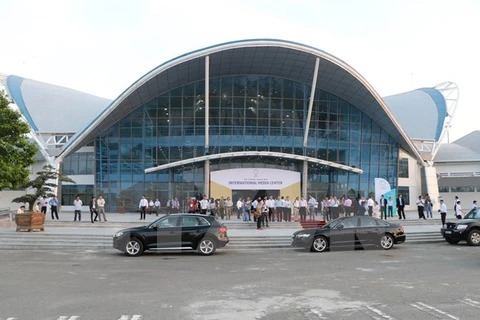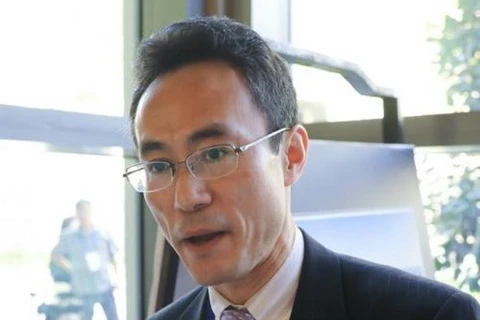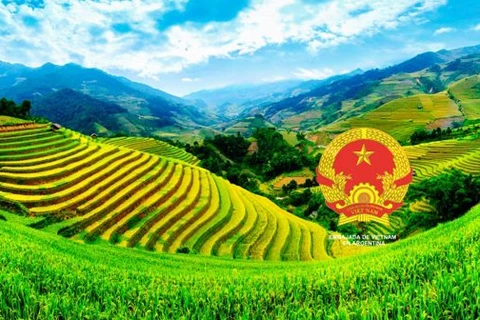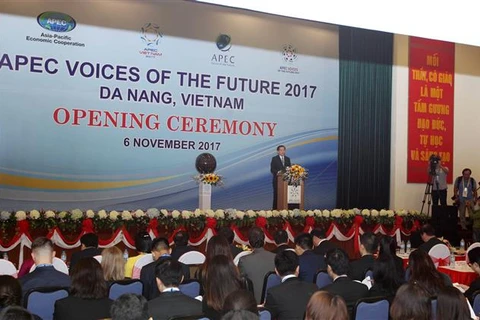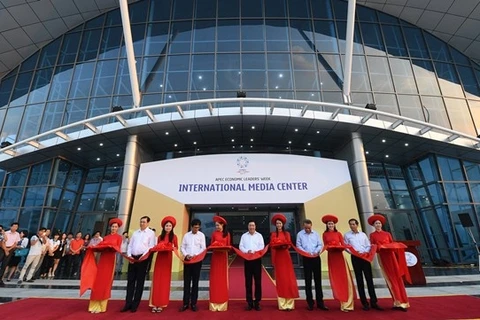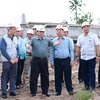 An overview of Da Nang city - which is hosting the APEC Economic Leaders' Week 2017 from November 4-11 (Photo VNA)
An overview of Da Nang city - which is hosting the APEC Economic Leaders' Week 2017 from November 4-11 (Photo VNA)Hanoi (VNA) – Vietnam became a member of the Asia-Pacific Economic Cooperation (APEC) forum 19 years ago, an important milestone in the implementation of the Party and State’s external policies of expansion, diversification and multilateralisation of relations and international economic integration.
While commenting on the importance of APEC to Vietnam, Deputy Prime Minister and Foreign Minister Pham Binh Minh said APEC is a leading economic cooperation mechanism in the region and globally. For Vietnam, APEC has strategic importance in both politics and economics.
Strategic move
The APEC forum was established on November 6, 1989 in Canberra, Australia, as one of the first cooperation mechanisms in the region to promote economic partnership and connectivity.
After nearly three decades, APEC has become a leading economic cooperation mechanism in the Asian-Pacific region with the involvement of major economies like the US, China, Japan, Russia and Canada. APEC represents 39 percent of the world’s population and contributes 57 percent to global GDP and 49 percent of international trade.
Recognising the importance of APEC to external policies future development, on June 15, 1996, Vietnam applied for membership. In November that year, the Politburo issued a Resolution on improving the efficiency of the external economy in 1996-2000. On November 14, 1988, the Southeast Asian country was admitted to the forum along with Russia and Peru.
Increasing Vietnam’s position
Deputy Minister of Foreign Affairs Bui Thanh Son affirmed that since Vietnam joined APEC in 1998, the forum has supported the country’s efforts to push ahead with reform and economic restructuring, change growth model, and integrate into the global economy.
APEC is a key factor in boosting Vietnam’s position and capacity on the international arena. Along with membership in the Association of Southeast Asian Nations (ASEAN) in 1995, the Asia-Europe Meeting (ASEM) in 1996, and the World Trade Organisation (WTO) in 2007 and being a non-permanent member of the UN Security Council in the 2008-2009 tenure, admission to APEC has helped increase the position of Vietnam in the region and beyond.
Joining APEC also supported Vietnam’s efforts in multilateralisation and diversification of international relations and deepening bilateral relations between Vietnam and APEC members. This is significant since APEC consists of Vietnam’s top economic partners, accounting for 75 percent of trade, 78 percent of foreign direct investment, 38 percent of official development assistance, and 79 percent of foreign tourists to Vietnam.
Contributions to build a “common house”
Only eight years after joining APEC, Vietnam hosted the forum for the first time in 2006. With more than 100 activities, notably the APEC Economic Leaders’ Week in mid-November, Vietnam held a successful APEC 2006. The 14th APEC Economic Leaders’ Meeting in Hanoi adopted important documents for APEC’s development, including the Hanoi Action Plan to implement the Busan Roadmap towards the Bogor Goals on trade and investment liberalisation by 2020.
The Hanoi Action Plan proposed by Vietnam was an important contribution to realise measures to promote trade, investment and sustainable development, prevent diseases, develop human resources, improve competitiveness of small-and medium-sized enterprises, prevent corruption, and embrace links among APEC member economies.
Now 11 years on, Vietnam once again hosts the APEC Year, during which the country has put forth initiatives to build a “common house” and promote cooperation among member economies in various fields such as preventing avian influenza, coping with natural disasters, and developing human resources.
Vietnamese ministries and departments have implemented more than 100 projects and activities to enhance cooperation in new and practical issues such as aviation transport security, community-based natural disaster risk management, and infrastructure investment in ensuring food security.
Vietnam’s admission to APEC demonstrated the country’s aspiration for reform and international integration as well as contributions to peace, cooperation and development in the region and the world.
Established in 1989, the Asia-Pacific Economic Cooperation (APEC) forum comprises 21 economies, including Australia, Brunei, Canada, Chile, China, Hong Kong-China, Indonesia, Japan, the Republic of Korea, Malaysia, Mexico, New Zealand, Papua New Guinea, Peru, the Philippines, Russia, Singapore, Chinese Taipei, Thailand, the US, and Vietnam.-VNA
VNA
